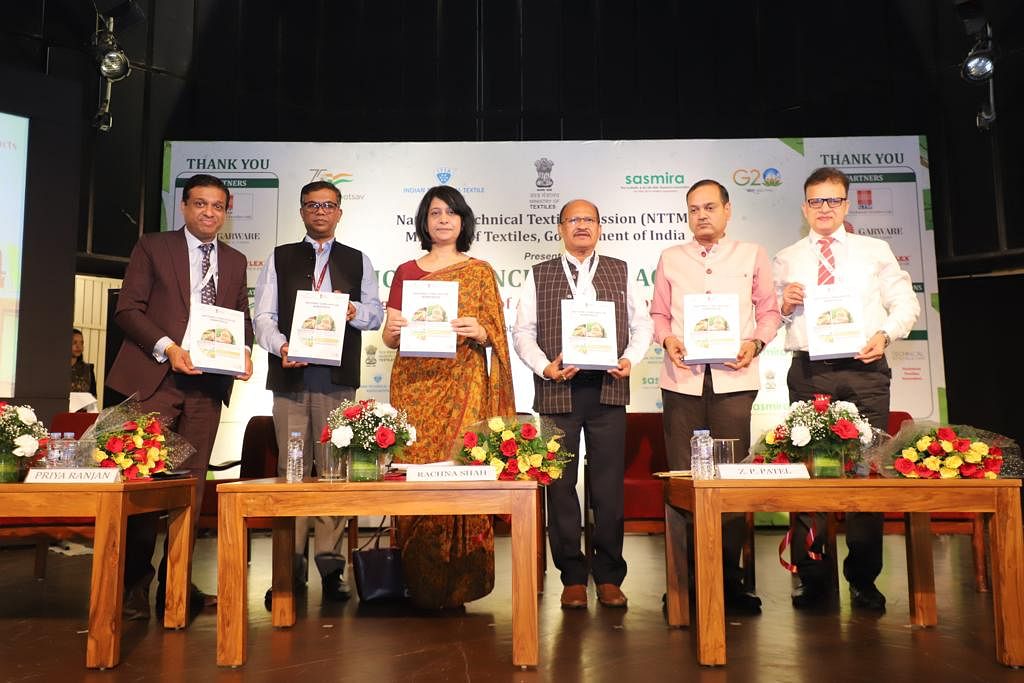
The Ministry of Textiles, under its flagship initiative, the National Technical Textiles Mission (NTTM), convened the National Conclave on Agrotech to highlight the critical role of enhancing the productivity of agricultural and horticultural products in India.
The event, held in association with the Indian Technical Textile Association (ITTA) and the Synthetic & Art Silk Mills' Research Association (SASMIRA), brought together experts, officials, and stakeholders from various sectors. The conclave comprised five technical sessions that centered on sustainable and resilient agricultural innovations, Indian standards, and Quality Control Orders (QCOs) in Agrotextiles, performance, and sustainability of Agrotextiles, as well as recent advances in Agrotech technology, including digital transformations in agriculture and horticulture.
A special session was dedicated to exploring future growth opportunities in Agrotextiles, and during the event, a Conclave Booklet and a Report on the Indian Agrotech Industry Opportunity: 'Fibre to Field' were unveiled. Over 150 participants, including officials and representatives from Central Ministries, user Departments of Central and State Governments, Institutes, industry leaders, scientific experts, researchers, and professionals in Agrotextiles, attended the conclave.
Rachna Shah, Secretary, Ministry of Textiles, Government of India, emphasized the pivotal role of agriculture in the Indian economy, with its contribution consistently accounting for around 18-20% of the country's GDP. She noted that Agrotextiles could address unique agricultural challenges such as climate variations, water constraints, and the high demand for agricultural produce on limited arable land. The use of Agrotextiles has proven instrumental in improving agricultural productivity and the quality of agri-based products by extending crop growing cycles, and protecting plants from adverse weather conditions and pests, among other benefits.
Research and studies have underscored the significant impact of Agrotextiles on horticulture, leading to increased farm productivity by 2-5 times, higher crop intensity, a 30-45% reduction in water consumption, a 25-30% decrease in fertilizer usage, and increased harvest cycles per year. Shah stressed the importance of a collaborative approach among Certification Agencies, Research Organizations, Industry, Academia, and the Ministry to address the cost implications of Agrotextiles and enhance awareness and education among farmers for wider adoption.
ZP Patel, Vice Chancellor of Navsari Agriculture University, highlighted that climate change, especially in rain-fed areas, results in an average farming production loss of 10-40%. Agrotextiles, including Crop Cover, Mulch mats, and Polyhouses, hold the potential to manage and stimulate microclimates for crops, leading to higher agricultural productivity. Patel emphasized the need for bio-degradable agro-fiber-based agrobags, innovative Agrotextile products like soil-degradable Agro-fabrics, and super-absorbent polymer fibers to address various agricultural challenges.
Rajeev Saxena, Joint Secretary, Ministry of Textiles, Government of India, pointed out that India possesses significant potential in the global Agrotextiles market, which is valued at approximately USD 12 billion, with India's share at around 3%. He highlighted that the Ministry of Textiles has notified Quality Control Orders (QCOs) for 20 Agrotextile items, which will come into effect from April 1, 2024, ensuring superior quality and safety. Additionally, the Ministry has sanctioned 11 R&D projects in Agrotextiles worth Rs 13.67 crore for the development of innovative products. Saxena also announced the establishment of a Climate Smart Agrotextile Demonstration Center in partnership with SASMIRA to revolutionize agriculture through digitized microclimate farming.
Priya Ranjan, Joint Secretary (INM Horticulture), Ministry of Agriculture & Farmers Welfare, emphasized the vital role of Agrotextiles in addressing the challenges faced by the agriculture sector due to climate change, soil degradation, and water scarcity. He noted that schemes like the Mission for Integrated Development of Horticulture (MIDH) have incorporated various Agrotextile products for broader usage. Ranjan highlighted the potential for adopting advanced technologies in Agrotextiles to increase agricultural yields, reduce input costs, and ultimately enhance farmers' income.
Ashok Tiwari, Senior Director, SASMIRA, expressed appreciation for the Ministry of Textiles' support and the participation of dignitaries from various organizations in the conclave.
















